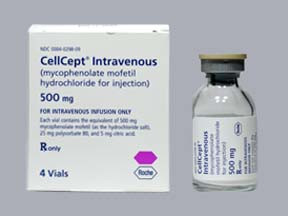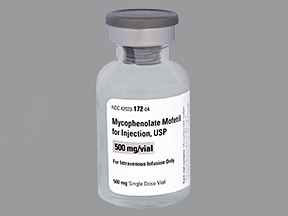MYCOPHENOLATE MOFETIL HYDROCHLORIDE - INJECTION
PHONETIC PRONUNCIATION: (MYE-koe-FEN-oh-late MOE-fe-til HYE-droe-KLOR-ide)
COMMON BRAND NAME(S): Cellcept
GENERIC NAME(S): mycophenolate mofetil HCl
Uses
USES: Mycophenolate is used in combination with other medications to keep your body from attacking and rejecting your transplanted organ (such as kidney, liver, heart). It belongs to a class of medications called immunosuppressants. It works by weakening your body's defense system (immune system) to help your body accept the new organ as if it were your own.
How to use MYCOPHENOLATE MOFETIL HYDROCHLORIDE - INJECTION
HOW TO USE: Read the Medication Guide provided by your pharmacist before you start using mycophenolate and each time you get a refill. If you have any questions, ask your doctor or pharmacist. This medication is given by injection into a vein (IV) by a healthcare professional. It is given as directed by your doctor, usually twice daily. It is injected slowly over at least two hours. Mycophenolate must not be given by bolus or rapid IV injection. When you are able to take medications by mouth, you may be switched to an oral form of this medication. The injection form of this medication should not be used for longer than 2 weeks unless you are directed to do so by the doctor. Avoid getting the prepared liquid on your skin or in your eyes. If contact occurs, wash the affected skin area well with soap and water or rinse your eyes with plain water. Since this drug can be absorbed through the skin and may harm an unborn baby, women who are pregnant or who may become pregnant should not handle this medication. Use this medication regularly to get the most benefit from it. To help you remember, use it at the same times each day. The dosage is based on your medical condition and response to treatment. It is very important to continue using this medication even if you feel well. Do not stop using mycophenolate without first talking to your doctor.
Side Effects
Precautions
Interactions
Overdose
Images
Reviews
Faq for MYCOPHENOLATE MOFETIL HYDROCHLORIDE - INJECTION
Mycophenolate Mofetil Hydrochloride Injection is used to prevent organ rejection in patients who have undergone a kidney, liver, or heart transplant.
It works by suppressing the immune system to prevent it from attacking the transplanted organ.
Common side effects may include diarrhea, nausea, vomiting, stomach pain, and headaches.
It is given as an injection into a vein by a healthcare professional.
The dosage and frequency of Mycophenolate Mofetil Hydrochloride Injection will be determined by your doctor based on your transplant type and specific medical condition.
Yes, it is important to inform your doctor about any other medications you are taking, as some may interact with Mycophenolate Mofetil Hydrochloride. It is also crucial to avoid pregnancy or breastfeeding while taking this medication.
Yes, it can be used in children, but the dosage and usage guidelines may vary compared to adults. Consult your doctor for specific recommendations.
Contact your doctor or healthcare provider as soon as possible to discuss the next steps.
It is generally recommended to avoid alcohol while taking this medication, as it may increase the risk of certain side effects.
Warning
WARNING: Mycophenolate may lower your ability to fight infections. This may make you more likely to get a serious (rarely fatal) infection or make any infection you have worse. Tell your doctor right away if you have any signs of infection (such as sore throat that doesn't go away, fever, chills, cough, burning/painful/urgent urination, change in the amount of urine). Mycophenolate may rarely cause cancer (such as lymphoma, skin cancer). Protect your skin from the sun. Avoid prolonged sun exposure, tanning booths, and sunlamps. Use a sunscreen and wear protective clothing when outdoors. Tell your doctor right away if you have any of the following symptoms of cancer: swollen glands, sudden weight loss, night sweats, change in appearance or size of moles, or unusual skin changes/growth. Mycophenolate may harm an unborn baby. When using mycophenolate, all males - and all women of childbearing age - must use reliable forms of birth control. See also Precautions section.
Disclaimer
IMPORTANT: HOW TO USE THIS INFORMATION: This is a summary and does NOT have all possible information about this product. This information does not assure that this product is safe, effective, or appropriate for you. This information is not individual medical advice and does not substitute for the advice of your health care professional. Always ask your health care professional for complete information about this product and your specific health needs.



No Reviews Yet